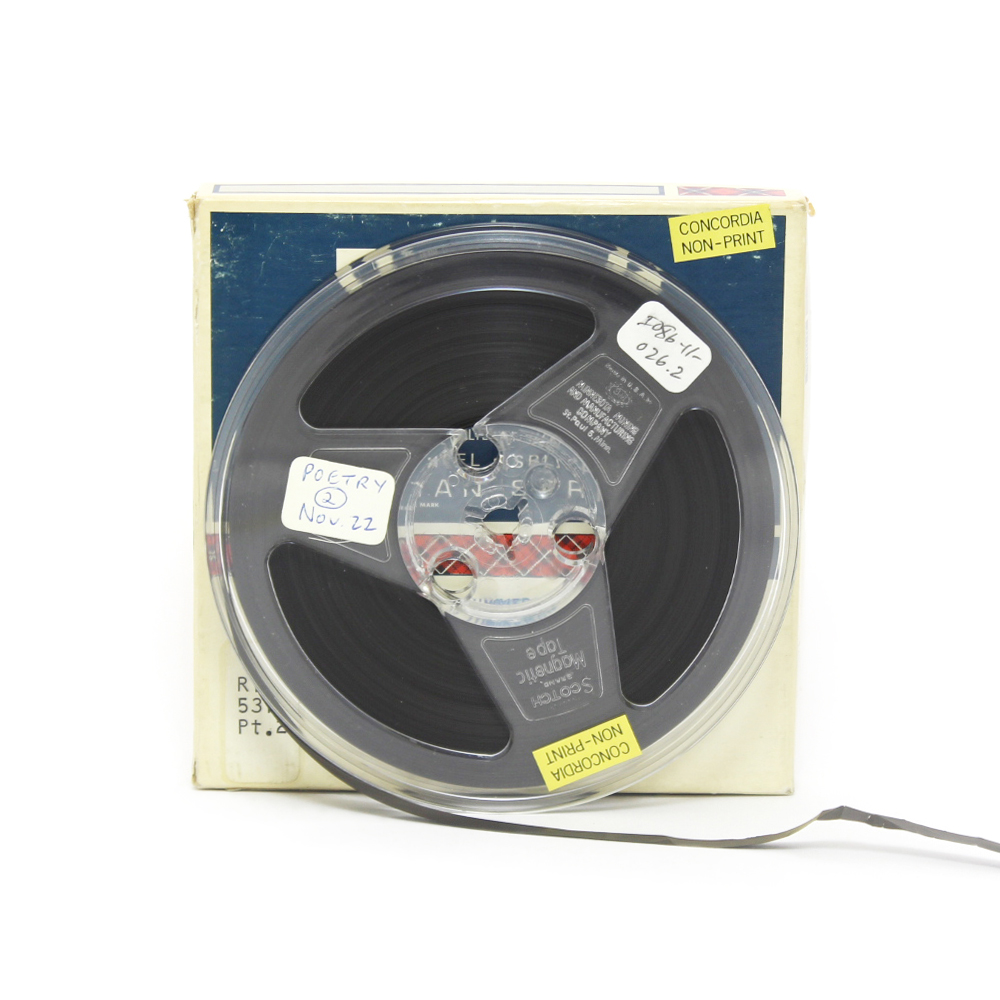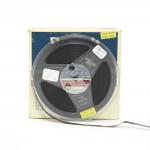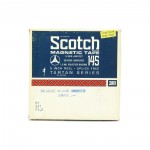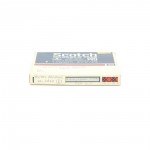bpNichol and Lionel Kearns at SGWU, 1968, Part 2
Annotation
00:00:00.00
Recording begins mid-sentence, Lionel Kearns continues "The Parable of the Seventh Seal".
Annotation- Lionel Kearns
00:00:01.45
Continues "The Parable of the Seventh Seal". [Audience laughter.]
Annotation- BP Nichol
00:06:17.58
Reads "Historical Implications of Turnips"
BP Nichol
00:07:01.95
This is called, for a reason I cannot remember at all, "Cycle Number 22".
Annotation- BP Nichol
00:07:13.04
Reads "Cycle Number 22".
BP Nichol
00:07:49.86
This next poem's called "The Child in Me". It's kind of what all sound poetry's about anyways. Enough said.
Annotation- BP Nichol
00:08:09.21
Reads "The Child in Me".
BP Nichol
00:09:10.08
This is a poem called "The New New Captain Poetry Blues" and it's for David McFadden. Captain Poetry is kind of this person that happened a long time ago in a magazine I used to edit called Ganglia, and David McFadden is still happening in Hamilton, and is probably Canada's best poet and what else is there to say? Oh yes, a little footnote, there's a place in here called "Plunkett" which really exists and my mother was born there strangely enough. This is all about that.
Annotation- BP Nichol
00:09:48.05
Reads "The New New Captain Poetry Blues".
Lionel Kearns
00:12:53.78
This poem is called "Split".
Annotation- Lionel Kearns
00:12:59.00
Reads "Split".
Lionel Kearns
00:14:07.73
People occasionally, when they're put on the spot to ask me questions, say "What's it like to be a poet", or "Is it true that so and so and so and so.." and things like that, questions that are impossible to answer. But there is something about being a poet, and this is one of the things, this is one of the differences, and this poem is called "The Difference".
Annotation- Lionel Kearns
00:14:40.25
Reads "The Difference". Published as “Roles” [Recording is often CUT to remove laughter and applause from the recording.]
Lionel Kearns
00:15:40.44
This is an older poem, it's a Christmas poem, it was written at the time when Coustchef got his call down, also about the time of the American intervention in the Dominican Republic, where the Americans came in because they knew that there were Cuban influences, or the Cubans were behind the so-called rebels in the Dominican Republic and one of the proofs was that some of the rebels had been seen wearing green uniforms. Of course, most military uniforms are kind of green, but they pointed out that some of Fidel Castro's soldiers had green uniforms too. But this is Christmas poem.
Annotation- Lionel Kearns
00:16:51.11
Reads "Christmas Poem”.
Lionel Kearns
00:17:57.92
I make most of my living teaching at Simon Frasier University and we have some troubles out there sometimes. One of the things that troubled us was the fact that when we were giving lectures to large crowds, we sometimes used the public address system and we found out that back- that the public address system was hooked up with- operated with an FM band, and the, all your lectures could be picked up on an FM set, for example, an FM set in the President's office. We've since lost that President. And this is called "University".
Annotation- Lionel Kearns
00:18:55.74
Reads "University". [note: recording has a double recording of the reading in part 1.]
Lionel Kearns
00:19:24.05
This one is called "Economic Chronology".
Annotation- Lionel Kearns
00:19:29.35
Reads "Economic Chronology".
BP Nichol
00:19:42.46
This one's called "Alimony, Old Baloney".
Annotation- BP Nichol
00:19:51.08
Reads "Alimony, Old Baloney".
Annotation- BP Nichol
00:24:15.48
CUT in tape, but perhaps reads from the same series of Captain Poetry stories. "One day CP hitched a ride..." [INDEX: bill bissett, David McFadden.]
Lionel Kearns
00:26:25.57
Well if BP is going to keep reading his Captain Poetry poems, I'm going to read my “Ventilation Parable”. This is an epic.
Annotation- Lionel Kearns
00:26:43.20
Reads "Ventillation Parable".
Lionel Kearns
00:31:19.43
This poem is called "Creation"
Annotation- Lionel Kearns
00:31:24.08
Reads "Creation".
BP Nichol
00:31:52.06
I'm going to do that dangerous thing and read a poem I wrote last night. That's [inaudible-- tape warps and speech is inaudible.]
Annotation- Lionel Kearns
00:32:00.45
Reads line "Imagination Explodes, they grow old quick and die"
BP Nichol
00:32:21.82
[Tape rewinds back to BP Nichol introducing poem at 31:52.] I'm going to do that dangerous thing and read a poem I wrote last night. That's waking Lionel up at 7:30 this morning which he didn't quite forgive me for. It starts off with a quote from a poem by Bobby Hoat [?.] Well, yesterday we were up at Carlton doing a reading there. It's a poem called "Zero Phase". There's a town referred to in here called "Vars" which happens to be where he lives. It's a very groovy little place, just outside of...
Lionel Kearns
00:32:51.57
Can you hear?
BP Nichol
00:32:52.82
Is that okay? If I talk kind of into it like this?
Annotation- BP Nichol
00:33:04.05
Reads "Zero Phase".
BP Nichol
00:34:36.91
This is a poem called "Returning". It sort of was written after I wrote a book of poetry called Journeying and the Returns.
Annotation- BP Nichol
00:34:58.26
Reads "Returning".
Lionel Kearns
00:37:49.50
I'm going- I'm going to read a series of poems again, from my collection Pointing. This one is called "It's".
Annotation
00:38:10.41
NOTE: The part of the recording is repeated from I086-11-026.1 (the first part of this reading) from 53:28.68, and Cuts out again at 54:02.90.
Annotation- Lionel Kearns
00:38:13.16
Reads "It's".
Lionel Kearns
00:38:45.64
A lot of the poems in this book, derive their images from dreams, and this is a poem which is about a dream I had. And it's- I've interpreted the dream some extent of the poem- I interpreted as a kind of message about where I do get my images for my poems, or where I got them at this particular period. And I called "Ambergery, a Statement on Source". Ambergery, being that stuff that sick whales cough up and which floats around on the ocean and it's very smelly stuff but it's very valuable stuff if you find it floating around because you can sell it for a great deal of money to perfume factories. And that's the interpretation of the series of images that follow.
Annotation- Lionel Kearns
00:39:55.13
Reads "Ambergery, a Statement on Source".
Lionel Kearns
00:40:42.64
And this one, called "Contra-diction", it's a poem that is often anthologized. It's a poem that I like because I think it does what usually I'm trying to do in poems. It's not a very big poem, but it's neat, I think.
Annotation- Lionel Kearns
00:41:12.36
Reads "Contra-Diction".
Lionel Kearns
00:41:40.16
This one is called "Both".
Annotation- Lionel Kearns
00:41:45.68
Reads "Both".
Lionel Kearns
00:42:07.53
[CUT] This is an early poem that I wrote, it fits into a series of poems that I was writing at the time in which I was dealing with my own background, trying to come to terms with things like my own Catholic background, and as you will see the central image is a Christian one. The situation is the fairgrounds actual- the actual situation is the PNE- the Pacific National Exhibition. It's an easter poem called "Friday at the Ex"
Annotation- Lionel Kearns
00:43:07.04
Reads "Friday at the Ex".
Lionel Kearns
00:44:34.55
And this one, called "Prototypes".
Annotation- Lionel Kearns
00:44:41.89
Reads "Prototypes".
Lionel Kearns
00:45:33.07
And I think this is the last one I'll read, it's called "End Poem". An appropriate title.
Annotation- Lionel Kearns
00:45:42.12
Reads "End Poem".
Annotation- BP Nichol
00:46:05.67
[CUT] Reads line "I wanted to forget you, so I tried to erase your name...".
Annotation
00:46:47.84
END OF RECORDING.




